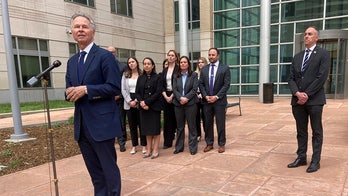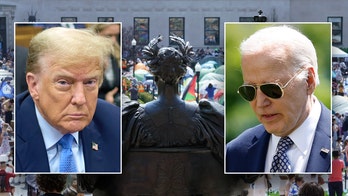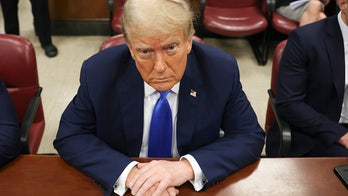The White House was indicating Tuesday that short-term help is on the way to Detroit automakers teetering on economic collapse after the Senate rejected an auto bailout last week.
The Bush administration has been gathering financial information from the auto companies since then and reviewing its options.
Treasury Secretary Hank Paulson told FOX News that he and other Bush administration officials are exploring the options and in the process of making a decision but declined to say when one would be reached.
"We've got some time," he said. "So we're not stalling. We're obviously moving ahead with all deliberative speed right here but we've got a little bit of time."
In Detroit, Sen. Carl Levin, D-Mich., said he expects General Motors to get $8 billion and Chrysler $7 billion from the Bush administration. He said Paulson likely would be tapped as a "car czar" to oversee restructuring of the companies.
Paulson didn't discuss this possibility with FOX News but asserted that a failure of the auto industry would not be good for the economy.
"I've said and I agree with the president said, that our economy is in a fragile state right now and failure is not a good thing," he said. "But the key thing is that any solution that there be put them on a long-term path to viability. That's absolutely critical."
GM and Chrysler have said they could run out of cash within weeks without support from the government.
"An abrupt bankruptcy for autos could be devastating for the economy," Bush told reporters Monday aboard Air Force One during a surprise trip to Iraq and Afghanistan. He said they were "now in the process of working with the stakeholders on a way forward."
Bush wouldn't give a precise timetable but said, "This will not be a long process because of the economic fragility of the autos."
Vice President Dick Cheney, in an interview with talk show host Rush Limbaugh, cautioned that "if the automobile industry goes belly up now, there's a deep concern that would be a major shock to the system."
Following the defeat of a $14 billion bailout package in the Senate last week, administration officials are weighing several options. They include using money from the $700 billion financial bailout fund, known as TARP, to provide loans to the automakers or as collateral for emergency loans the automakers could get from the Federal Reserve. Bush reiterated that tapping the financial bailout fund remains an option.
Paulson told FOX News that he was disappointed by the defeat of the bailout package in the Senate, which would have pulled from funds other than TARP, which is intended to help the financial system, not manufacturers.
"That's not to say the manufacturers are not important," he said. "But that was not the purpose of the TARP. And Congress was working toward a solution and unfortunately they had to leave without coming up with one."
Paulson explained how the Bush administration would be justified in using TARP funds for the auto industry.
"The concern here is that we have a significant issue we've been dealing with and are still dealing with in terms of our financial system," he said. "And it is very important that the system be stabilized and it's very important to the overall economy. And TARP was targeted for that purpose by Congress."
House Speaker Nancy Pelosi, D-Calif., said the bailout funds were "the only recourse that they have" because of the failure to pass legislation in Congress. She said "something will have to happen imminently" but requirements for restructuring should be attached to the funds.
"Otherwise, we're just giving life support, rather than a lifeline for viability into the future," Pelosi said.
White House spokesman Tony Fratto told FOX News Tuesday that Bush administration officials are taking their time to make sure the right solution for the auto industry is chosen
"There's no questions that the automakers are in a fragile state but we're going to take the time we have available to get the right policy decision and make sure these firms are making the tough decisions and concessions necessary to become viable firms," he said.
"The economy is in a fragile state," he continued. "The automakers are in a fragile state but we do think we have enough time to come to the right policy conclusions."
Fratto added that to "let these firms to dissolve or collapse in a disorderly way would be extremely dangerous for our economy so we want to deal with him in an appropriate and responsible way."
White House officials said they are keeping President-elect Barack Obama and his advisers informed of the discussions. If administration officials choose not to provide the money now, the Obama team could wait for the new Congress, which will have stronger Democratic majorities. But the delay could risk bankruptcy filings by GM and Chrysler.
The White House previously had insisted on limiting use of the Wall Street rescue plan to helping financial institutions. It changed course after the auto bailout bill failed in Congress, citing the consequences to the overall economy if U.S. carmakers failed.
Levin said he expects the Bush administration's plan to help the Detroit automakers will be similar to the previous deal the White House reached with congressional leaders.
That plan providing loans for GM and Chrysler to help them survive until March 31 was passed by the House last week but blocked by the Senate, mainly by Republican senators, after the United Auto Workers union balked at making up front wage concessions to take effect sometime next year. Ford Motor Co. has said it has enough cash to survive 2009.
The Associated Press contributed to this report.




